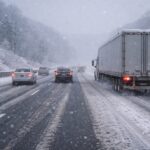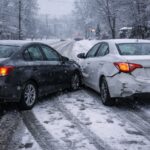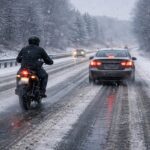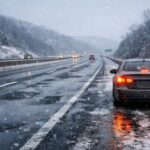Here we are in February, and regardless of what the groundhog saw, we at Stillman and Friedland are still seeing winter accidents.
Recent news has the dramatic footage of Friday’s multi-car pile-up in our neighboring state of Missouri. Winter storm Nadia caused the treacherous conditions on Missouri’s Interstate 70 near Oak Grove. A mind-boggling 47 cars were involved in the crash, which resulted in one fatality.
Very poor visibility and bad road conditions conditions meant that drivers were moving with enough caution to reduce the force of impact for many cars. This is evidenced by the fact that there was only one fatality–in the car which started the chain collision. Still, had most cars been moving more slowly, they might have been able to brake sooner or more effectively and avoid the pile-up.
Since winter is not over yet, here’s some food for thought: The right tires can help you avoid skidding and allow you to brake in time on winter roads. Add better tires to more cautious driving and get an edge on icy roads when braking is crucial. Today we will take a look at the results of tests run by Popular Mechanics . The PM staff tested both snow tires and all-season radial tires under snowy, wintry conditions using both all-wheel drive (AWD) and forward-wheel drive (FWD) and found that:
“On snow tires, both cars came to a halt about a car length sooner—often the difference between a close call and a call to your insurance company [and your lawyer] .”
In any accident, material differences in distance and time affect can affect how badly the driver and passengers are impacted. For this reason, we advise our clients to use snow tires instead of all-season tires during the winter months. The safety advantage you get far offsets the inconvenience of changing tires in the fall and spring.
Why can’t you keep snow tires on in the summer? A major reason is that snow tires are made to be flexible especially under very cold conditions. One manufacturer even uses soybean oil added into the the rubber to keep it soft when the weather and the road are icy. As you can imagine, these softer tires would easily wear out in the summer months due to the heat.
If you still cannot be bothered with the inconvenience of changing tires, PM also reports that the newest all-season tires are “winter biased.” This means that their formulation is skewed towards tackling snowy and icy conditions, while also durable under summer conditions. These tires might be a good option for someone who does not necessarily need to drive in severe snowy weather. If you must commute to work every day, choose winter tires, not all-season models.
Here are some key tips we learned:
- If you drive frequently or daily, choose winter tires for the safest driving.
- If you need snow tires, get a full set of 4 for maximum benefit.
- All-season tires are being manufactured to be more like winter tires, meaning that tire makers are aware of how crucial it is to drive well in snow and ice.
- Store your “other season” tires in plastic bags to prevent oxidation.
- Use preventive driving to reduce your risk of fatal accidents–drive slowly, especially when visibility is low and roads are icy.
- If possible, avoid driving in bad weather.
Best buy options: Now is a great time to shop President’s Day and end-of-winter sales to get a bargain price on a set of four snow tires. If you don’t have snow tires, the upcoming continued snowy weather is a good reason to get a set now. We did a quick check online and found some great deals on major brands. We always suggest that you check online product reviews for
safety–this mini-research is an investment that pays!
As always, we recommend that if you are going to be out in snowy weather, be fully equipped with these handy items
- First aid kit
- Sand and/or salt for stability and traction
- Snow shovel
- Windshield scraper/brush
- Flash light
- Blanket
- Optional: Water and snacks
- Reflecting vest and cone
- And keep your cell phone charged!
Two more winter snow storms are expected to hit Tennessee in the next week. Avoid driving if conditions are bad; if you have to go out, drive slowly and be equipped!
Above all, stay safe!
Because we care…






